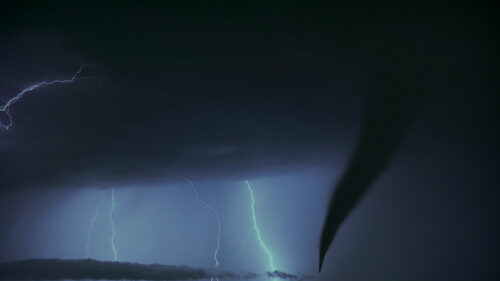Did you hear tornado sirens sounding in your city at some point this month? March is a very popular time for severe weather awareness campaigns in many states. Which got me thinking…you’re prepared on what to look for in the skies, what to do when the sirens sound, how to react if you’re outside and you see lightning, how to always go to the lowest level in your home or the building you’re in if a tornado is in the area, and so much more. But do you have a plan in place for your family? Do you have the proper insurance coverage? Both are great questions, and absolutely critical this time of year.
Have a Plan
First and foremost, when it comes to storms, I believe your first thought shouldn’t be about the damage that can be caused to your real property — your house, your car, your beautiful trees/landscape, etc. Those things can all be replaced or repaired. When coming up with a storm preparedness plan, start by protecting the things and people who cannot be replaced, such as family members and pets. Construct a plan that involves the family meeting in the lowest level/interior room of the house. Once everyone is in that room, you’re given that sense of security that everyone is together and safe. In that room, have things like water, flashlights, blankets, extra batteries, and an external cellphone charger. You never know how long you’ll be there. Additionally, sometimes storms cause the power to go out, so try not to rely on weather alerts that use electricity. The safe play would be to download your local television station’s weather alert application to your phone. Often times, they’ll be streaming weather updates and this will give you the play-by-play of the storm…helping to keep you informed!
Home Preparations
Now, what can you do about your home and property? I suggest the following:
- Keep trees trimmed back from your home. Falling branches and trees are a huge reason for roof claims. Tree branches are no match for heavy winds.
- Trampolines need to be secured to the ground.
- Lawn furniture cannot only be expensive, but can also act as a missile. Try and keep your outdoor furniture in a somewhat protected area to limit the wind from blowing them against your home.
Also, it’s important to do annual checks around your home. If you notice dirt eroding around the base of your home from water, replace the dirt or develop a plan to divert rain waters away from your foundation. It’s also critical to check your home’s siding to make sure it’s still protecting your interior walls, and repair any loose siding. And lastly, have a licensed contractor check your roof every 5 years to repair loose shingles and to look for signs of deterioration.
Insurance
When it comes to insurance, two ways I suggest protecting yourself from financial hardship are:
- Replacement cost — Check your home for guarantee replacement cost. This assures your policy will pay to replace your items no matter the cost to the insurance company (at no additional cost to you).
- Loss of use — If your community is hit by a tornado, hurricane, etc., there may be hundreds of homeowners needing their homes replaced. Most policies cover the loss of use of your home for up to 12 months. It may take longer than that to get back into your home, so seek a policy with unlimited coverage or, at the very least, up to 24 months.
Obviously, we all know, catastrophic events are out of our control. At Holmes Murphy, we just want to ensure you’ve taken critical steps so you’re fully covered (literally and figuratively!). If you have questions on what kind of policies you need or simply want to make sure the policies you have in place will protect your home and family should severe weather impact you, reach out to us! We’re more than happy to share our knowledge with you!







